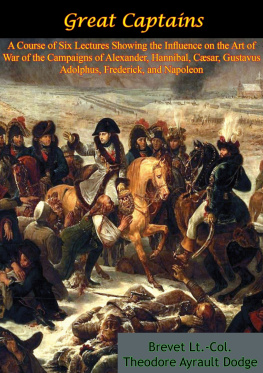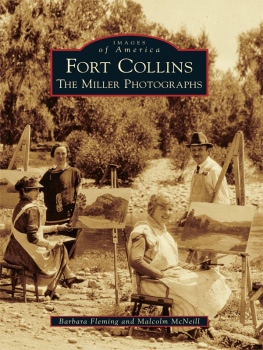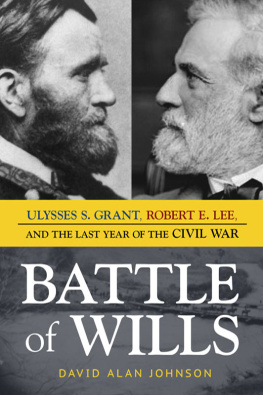2004 by The Kent State University Press, Kent, Ohio 44242
ALL RIGHTS RESERVED
Library of Congress Catalog Card Number 2003024736
ISBN 0-87338-785-6
Manufactured in the United States of America
08 07 06 05 04 5 4 3 2 1
Library of Congress Cataloging-in-Publication Data
Miller, Charles Dana, 18361898.
The struggle for the life of the republic:
a Civil War narrative by Brevet Major Charles Dana Miller,
76th Ohio Volunteer Infantry / edited by Stewart Bennett and Barbara Tillery.
p. cm.
Includes bibliographical references (p. ) and index.
ISBN 0-87338-785-6 (alk. paper)
1. Miller, Charles Dana, 18361898.
2. United States. Army. Ohio Infantry Regiment, 76th (18611865)
3. OhioHistoryCivil War, 18611865Personal narratives.
4. United StatesHistoryCivil War, 18611865Personal narratives.
5. Arkansas Post (Ark.)History, Military19th century.
6. United StatesHistoryCivil War, 18611865Campaigns.
7. SoldiersOhioBiography.
I. Bennett, Stewart, 1964 II. Tillery, Barbara, 1955 III. Title.
E525.576th.M55 2004
9737'471'092dc22 2003024736
British Library Cataloging-in-Publication data are available.
AS THE GREAT granddaughter of Charles Dana Miller, I am proud that his Civil War narrative is finally being published. It has been a century overdue.
My grandmother, Myrtle Miller Upshaw, was the oldest of the five children born to Charles D. Miller and his second wife, Mary Murdock Miller. She was born in 1884 and grew up in Newark, Ohio, until moving to Raleigh, North Carolina, in 1909. It is from her that I first became interested in her fathers Civil War narrative.
Sometime before 1960, Roy Gilman Miller, the youngest child of Charles and Mary Miller, transcribed the narrative and gave typewritten copies to his sisters, brothers, children, nieces, nephews, and some friends. I remember reading the manuscript in part in 1972 and giving a presentation on the Vicksburg chapter for my high school American history class in Raleigh. It was then that my grandmother told me that the original was handwritten by her father and was in the possession of her brother Roy in New York. How I wish now that I had contacted Roy, my great uncle, to ask him more about it, but having grown up in the South, I lacked sufficient enthusiasm for a Yankee narrative!
Years later I developed a deep interest in the Civil War and read the entire manuscript in 1994. I was enthralled with it and followed Millers every move using Civil War maps, modern day atlases, and a variety of resource materials. Millers readable style, flair for description, humor, and accuracy more than impressed me. I knew I had a rare treasure that needed to be made accessible to others who may benefit from it. I loaned the manuscript to several others who concurred with me that it was worthy of publishing; however, it was not until August of 1995 that I met Stewart Bennett, and my dream began to take the form of an attainable goal.
Stewarts keen interest in and knowledge of the Civil War, coupled with his desire to take on such a project, propelled the two of us on a path of research and discovery. While he undertook the massive process of researching and footnoting the manuscript, I began contacting family members, some of whom I had never met, in an effort to pool resources and information. In the process I learned, to our dismay, that the original handwritten narrative was nowhere to be found! We were certain that Roy Miller would not have destroyed it, but it had not yet been found among his possessions. Roy Millers son, Roy Jr., described it as being handwritten in a ledger book, but he had not seen it for many years. We proceeded with our work on the assumption that Roy Miller had transcribed from the original with little to no editing, but without the original, there were several questions that were left unresolved.
About the time we began our research, I was reading the August 1995 issue of Blue and Gray magazine when a sidebar caught my eye. The sidebar, containing a narrative written by a Union soldier, detailed the unhealthy conditions along the Black River in Mississippi during the Civil War and sounded very familiar to me. I was surprised to read Charles Dana Miller credited at the bottom of the piece, since it was the first evidence I had seen that the manuscript was known outside of the family. I called Chris Evans, the author of the article, and he told me that the manuscript is in the Tennessee State Library and Archives in Nashville. I called the library and discovered that they received a copy of Roy G. Millers transcribed manuscript in 1976, but not directly from Roy Miller.
Also in August 1995 Terry Winschell, historian at Vicksburg National Military Park, told me of a recently reprinted book, Charles Willisons A Boys Service with the Ohio 76th (1908; reprinted, Huntington, W.Va.: Blue Acorn Press, 1995), in which an entire appendix was of Millers narrative. It even had a picture of Miller that I immediately recognized, although the caption reads, Unidentified first lieutenant. I called Larry Strayer of Blue Acorn Press and learned that they indeed had a copy of the manuscript, which they too obtained from the Tennessee State Library and Archives.
In the meantime I tracked down Millers descendants all over the country who possessed his Civil War treasures. Among these items were the letters he wrote to his family during the war, his war pistol, his adjutants desk into which he later carved the regimental history, and his Civil War scrapbook, which includes newspaper articles of the battles during the war, letters from Grant, Sherman, and President Hayes, as well as letters and autographs from other military, political, and social leaders. The scrap-book and the adjutants desk have since been given to me by an uncle and Roy Miller Jr. My aunt gave me a box that had many Miller family documents and heirlooms in it, including photos of Miller, his will, and the Bible he carried with him during the war.

Millers scrapbook includes this letter written to him from President Ulysses S. Grant, dated April 27, 1878, from Milan, Italy. Miller served as the secretary for the Great Re-Union of the Veteran Soldiers and Sailors of Ohio, which was held in Newark on July 22, 1878. Grant was writing to decline the invitation to attend, saying, The Atlantic will be between us at the time of your proposed re-union and ends the letter by saying that he hoped none of the veterans of Ohio will ever feel a disposition to apologize for the part they took in the late struggle for national existence, nor for the cause for which they fought. With great respect, your old companion, U. S. Grant.












